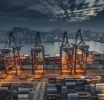
Real World Assets (RWAs)
Real World Assets (RWAs) stand as the backbone of the global economy, forming the tangible bedrock upon which financial systems are built. They are physical or tangible assets that have intrinsic value derived from their substance and utility. RWAs encompass a broad range of investment opportunities, ranging from real estate and land to physical commodities like gold and oil, as well as infrastructure projects such as highways, power plants, and telecom networks.
The significance of RWAs cannot be overstated. They provide both individuals and institutions with opportunities to invest in assets that are typically characterized by their stability, longevity, and potential to hedge against inflation. Unlike virtual assets whose value can be highly volatile and uncertain, RWAs offer a sense of security as their value does not hinge on the whims of market speculation to the same extent.
The significance of RWAs cannot be overstated. They provide both individuals and institutions with opportunities to invest in assets that are typically characterized by their stability, longevity, and potential to hedge against inflation. Unlike virtual assets whose value can be highly volatile and uncertain, RWAs offer a sense of security as their value does not hinge on the whims of market speculation to the same extent.

Real World Assets (RWAs)
The Role of RWAs in Economic Development
RWAs play a pivotal role in economic development. Infrastructure assets such as roads, bridges, and ports are vital for efficient transportation and logistics. Industries rely on these facilities to move goods across regions, bolstering trade and commerce. Investment in infrastructure is often cited as a critical driver for job creation and economic growth.On an industrial level, RWAs like factories and machinery contribute significantly to production capacity and employment rates. Investments in these areas often lead to technological advancements, higher productivity, and increased competitiveness on a global scale.
In terms of GDP contribution, RWAs provide stable returns over time through asset appreciation or income generation (such as rental income from properties). This stability can help buffer economies against the volatility of more speculative investments or financial instruments.
Investment Opportunities in RWAs
Investors have traditionally turned to RWAs like real estate due to their potential for capital appreciation and rental income streams. Commodities such as precious metals act both as hedges against inflation and portfolio diversifiers.Infrastructure investments are increasingly accessible through vehicles like specialized funds or public-private partnerships (PPPs), allowing investors exposure to large-scale projects without requiring massive capital outlays.
Emerging trends include crowdfunding platforms where individual investors can invest smaller amounts into larger projects or property developments. Technological advancements have also given rise to tokenization, where blockchain technology allows for fractional ownership of physical assets.
Risks and Challenges Associated with RWA Investments
While investing in RWAs offers benefits such as portfolio diversification and protection against inflation, it also comes with its own set of challenges. Market volatility can affect asset prices; liquidity issues may arise since physical assets cannot always be quickly sold without significant price reductions; regulatory changes can impact investment viability.Environmental concerns are paramount when considering investments in certain industries or infrastructure developments that may have detrimental impacts on ecosystems or contribute to climate change.
Ethical implications must also be considered – ensuring that labor rights are respected in the production of commodities or that real estate developments do not lead to gentrification or displacement of communities.
The Future of RWAs in a Changing World Economy
The future landscape for RWAs is likely to be shaped significantly by technological innovation – particularly big data analytics, AI-driven valuation models, remote sensing technologies for better asset management – improving efficiency in RWA markets.Moreover, there is an increasing awareness regarding sustainable investing which is leading towards “green” real estate development practices, renewable energy infrastructure projects, and ethical sourcing initiatives within commodity markets.
The evolution of RWA investments will likely see increased integration with technology platforms that offer streamlined processes for investment assessment, management, risk analysis - catering towards a more informed investor base seeking stability amidst global economic changes.
In conclusion, while new financial instruments continue to emerge offering novel forms of investment potentialities within the digital domain - it’s clear that Real World Assets will remain fundamental components within investment portfolios - prized for their tangibility and enduring value proposition within an ever-evolving global economy.
Real World Assets, Tangible Investments, Global Economy, Financial Systems, Investment Opportunities









Report
My comments